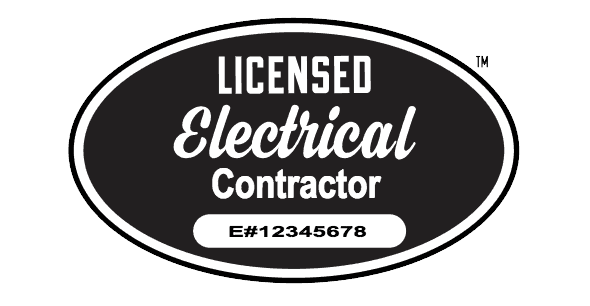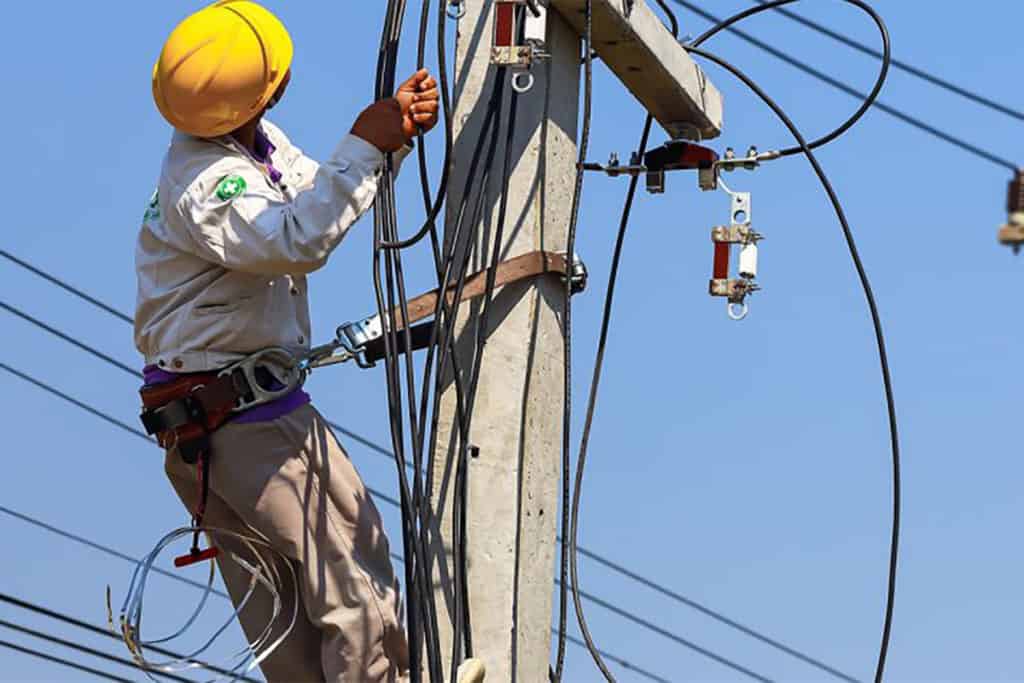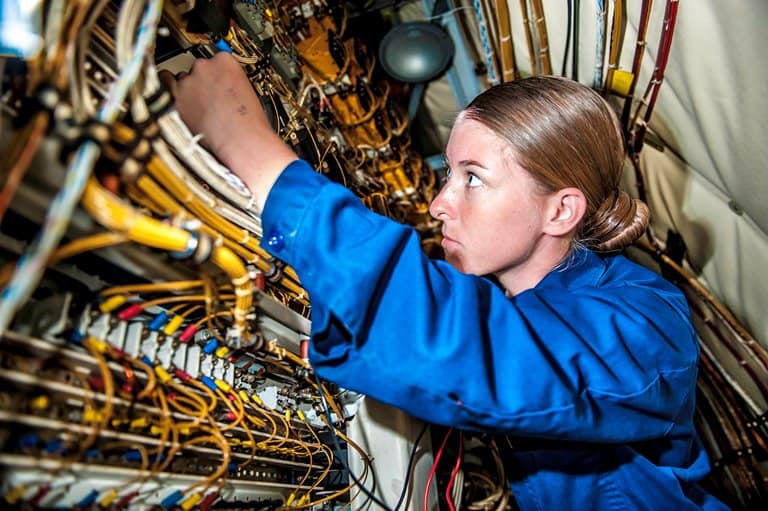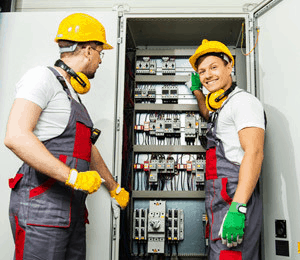
Now that more students are straying from the traditional 4-year college route, they’re developing a growing interest in trade skills. One of the most lucrative trade skills involves having knowledge about electrical components and wiring in homes. Going to a trade school and developing a trade skill allows students to approach a lucrative career in services that are constantly in demand.
According to the National Electrical Contractors Association (NECA), there are a few main differences between electrical contractors and electricians. Electrical contractors can act as firms or individuals who perform specialized construction tasks for designing, installing, and maintaining electrical systems. They make sure that electrical systems work environmentally-soundly, effectively, and safely.
There are different classifications when it comes to electrical contractors – this is based on the type of work they perform.
Also called ‘outside’ contractors, they install and maintain high-voltage distribution and transmission lines. They see to it that the electricity delivered from a power plant is properly transferred through various high-voltage lines and substations before it can power homes, buildings, or other facilities, such as schools.

These contractors work to maintain electricity to structures within a certain property’s boundary, which can include outdoor substations and lighting. They work as the main contractors for all things electrical in residential, institutional, and commercial properties, such as cabling installation, design, and maintenance.
Lastly, there are IBS contractors, also known as ‘Voice/Data/Video’ (VDV) contractors. They mainly work with low-voltage installations like security systems, fiber optics, wireless networks, climate controls, and back-up power. They make sure that all system controls perform for maximum energy efficiency.
On the other hand, licensed electricians are trained to perform different kinds of electrical work. They may be working as a self-employed electrician or under an electrical contractor. Most states have varying licensing requirements for electrical contractors and electricians.
They are further classified as apprentices either as an apprentice enrolled in an apprenticeship, a journeyman who has completed an apprenticeship program, or a master electrician, which is when a journeyman electrician has completed further testing and training.
If you’re interested in learning a trade skill and have an interest in electrical systems, you can get a stable career by becoming a licensed electrical contractor. As you gain more experience from the job, you earn better and enjoy the rewarding process of improving people’s lives.
To work as an electrical contractor, it’s important that you get a license before practicing in the field. Let’s walk through the requirements needed to get an electrical contractor’s license.

If you’re looking to work as an electrical contractor, here’s the road you need to follow for an awesome career in the trades.
For starters, you need to finish high school. If you’re still in high school, then that’s great. However, if you’ve already dropped out, you should get your diploma. If it’s been a long time since you dropped out, you can get the equivalent of a high school diploma i.e. a GED.
It really helps if your focus subjects in high school including physics, math, and chemistry. Not to mention, being athletic and part of sports teams gives you an advantage too.
Before you can dive into the commitment of working as an apprentice, you need to work as an electrician’s helper. You can get a part-time job as a helper during the summer vacation – there are plenty of openings since few people opt for helper jobs. Master Electricians will bring you along to the worksite and give you a general idea of what the work is like.
Even though your job will mostly involve tasks like cleaning tools, it serves as a great learning experience. For example, you learn about electrical safety, necessary tools, and electrical construction.
Most importantly, this is when you can assess whether or not the job of an electrical contractor is for you. When you train on-the-job instead of learning about it from afar, you get the opportunity to understand what it’ll be like if you work as a full-time electrical contractor.
If the work isn’t as interesting as you thought, you can think about pursuing another career path. But if you feel like this is what you want to pursue, you can go on to start an apprenticeship.
Next up, you have to attend vocational training at a trade school to complete an apprenticeship. Doing so helps you develop a great foundation for the theoretical and practical basics of the job. Apprenticeships also give you a number of opportunities to learn skills on the job.
It’s a complete journey in which you not only gain practical experience of how to deal with problems, but you also develop certain skills like communicating with clients and team members. Apprenticeships also help you earn money while you’re still learning, so not only do you avoid student loans, but making money as well.
After an apprenticeship, you have to become a journeyman electrical contractor. However, since this is your first step into the field without constant supervision, you need to pass the licensing exam. Every state has a leading authority on specific trade services, so you have to pass your state’s certification program for electrical contractors to get your license.
Of course, completing an apprenticeship successfully means you have the skills to be on the job, but you should still meet the specific requirements of your area.
For example, in California, candidates need to register as trainee electricians. They need to have completed classroom time totaling 720 hours and accumulated 8,000 hours of practical experience. In California, that’s 2 semesters of classroom studies and 4 years of apprenticeship. In addition, you’ll need to pass an aptitude test involving math and reading. Most importantly, you’ll need to know the concepts of the National Electrical Code.
Once you pass the exam, you’ll be notified. Then, you can receive your license from the state board of electrical licensing. Now that you’re a journeyman electrician, you can start working for a firm or as a solo contractor.
You can start by contacting local contracting firms and offering your services. Or, you can advertise your services to work with local homeowners or builders. If you’d like a different experience, try working for a local electric utility company.
The road to becoming a licensed electrician is the same as becoming a licensed electrical contractor. Your job will be a little different as opposed to an electrical contractor, but there will be certain similarities.
The requirements are the same, except that you will need to give a different test and that your apprenticeship will vary.

When you’re hiring an electrician to fix something in your home or office, you’ll want to make sure that they’re a professional. Sure, we understand that no one has the time to look up an electrician’s credentials when they’re suffering from a failed circuit breaker, but doing so can make all the difference when it comes to performance and safety.
If you have a recommendation as to which electrician you should hire, make sure to check the website first. That will give you a bit of an idea as to whether or not they have the skills to work as an electrician. However, don’t just fall for reviews, make sure to check the electrician’s license status.
Usually, qualified electricians happily give licensure information so customers can have peace of mine. You can use basic information from their license to check their licensure status.
You can check PHCEid.org to identify licensed electricians. In addition, the Better Business Bureau website is also a good place to check if the electrician is licensed or not. If the contractor you’ve considered hiring isn’t on these directories, you should hire one that is. If they are, make sure to check if their employees are licensed as well, and not just the head contractor.
PHCEid.org is an advocate for the Plumbing, Heating, Cooling, and Electrical contractor to properly identify their licensed status for public awareness. Professional Contractors have the license or certification to work in homes and businesses. Without the proper certification and licensing to become a skilled trades professional, it compromises the integrity of the trade industry.
The contractors listed on the PHCEid.org website are licensed or certified according to the codes and laws set forth by each governing state and/or entity. Licensed Contractors work in compliance with local and state codes set forth by their governing trade industry board. Get more information at PHCEid.org or call 844-954-2367 today!
